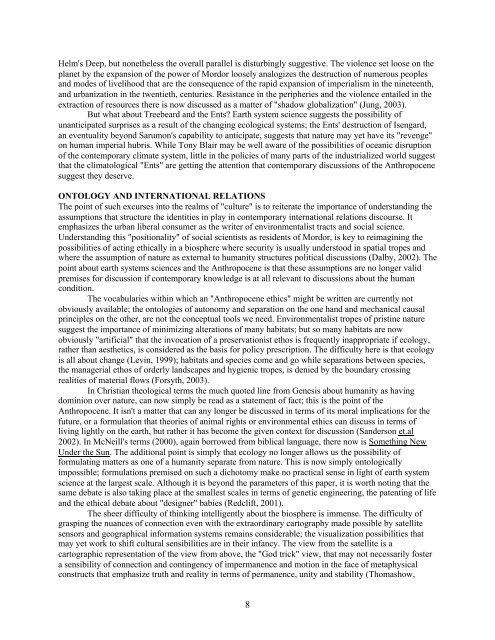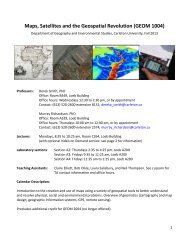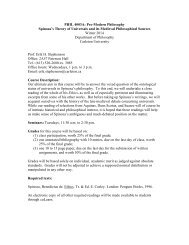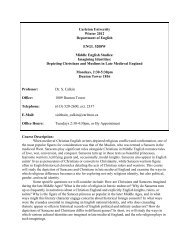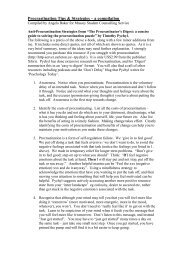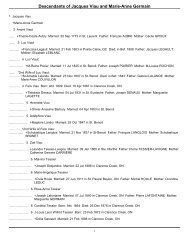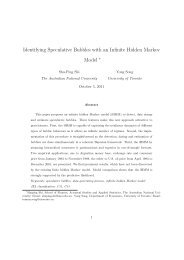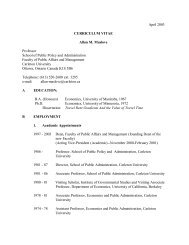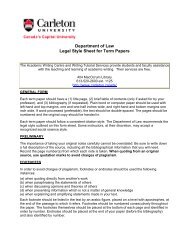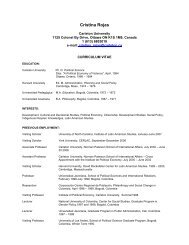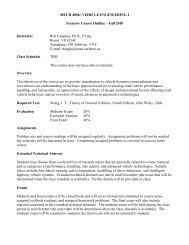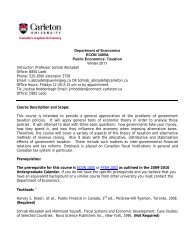anthropocene ethics: rethinking 'the political' after environment
anthropocene ethics: rethinking 'the political' after environment
anthropocene ethics: rethinking 'the political' after environment
- No tags were found...
Create successful ePaper yourself
Turn your PDF publications into a flip-book with our unique Google optimized e-Paper software.
Helm's Deep, but nonetheless the overall parallel is disturbingly suggestive. The violence set loose on theplanet by the expansion of the power of Mordor loosely analogizes the destruction of numerous peoplesand modes of livelihood that are the consequence of the rapid expansion of imperialism in the nineteenth,and urbanization in the twentieth, centuries. Resistance in the peripheries and the violence entailed in theextraction of resources there is now discussed as a matter of "shadow globalization" (Jung, 2003).But what about Treebeard and the Ents? Earth system science suggests the possibility ofunanticipated surprises as a result of the changing ecological systems; the Ents' destruction of Isengard,an eventuality beyond Sarumon's capability to anticipate, suggests that nature may yet have its "revenge"on human imperial hubris. While Tony Blair may be well aware of the possibilities of oceanic disruptionof the contemporary climate system, little in the policies of many parts of the industrialized world suggestthat the climatological "Ents" are getting the attention that contemporary discussions of the Anthropocenesuggest they deserve.ONTOLOGY AND INTERNATIONAL RELATIONSThe point of such excurses into the realms of "culture" is to reiterate the importance of understanding theassumptions that structure the identities in play in contemporary international relations discourse. Itemphasizes the urban liberal consumer as the writer of <strong>environment</strong>alist tracts and social science.Understanding this "positionality" of social scientists as residents of Mordor, is key to reimagining thepossibilities of acting ethically in a biosphere where security is usually understood in spatial tropes andwhere the assumption of nature as external to humanity structures political discussions (Dalby, 2002). Thepoint about earth systems sciences and the Anthropocene is that these assumptions are no longer validpremises for discussion if contemporary knowledge is at all relevant to discussions about the humancondition.The vocabularies within which an "Anthropocene <strong>ethics</strong>" might be written are currently notobviously available; the ontologies of autonomy and separation on the one hand and mechanical causalprinciples on the other, are not the conceptual tools we need. Environmentalist tropes of pristine naturesuggest the importance of minimizing alterations of many habitats; but so many habitats are nowobviously "artificial" that the invocation of a preservationist ethos is frequently inappropriate if ecology,rather than aesthetics, is considered as the basis for policy prescription. The difficulty here is that ecologyis all about change (Levin, 1999); habitats and species come and go while separations between species,the managerial ethos of orderly landscapes and hygienic tropes, is denied by the boundary crossingrealities of material flows (Forsyth, 2003).In Christian theological terms the much quoted line from Genesis about humanity as havingdominion over nature, can now simply be read as a statement of fact; this is the point of theAnthropocene. It isn't a matter that can any longer be discussed in terms of its moral implications for thefuture, or a formulation that theories of animal rights or <strong>environment</strong>al <strong>ethics</strong> can discuss in terms ofliving lightly on the earth, but rather it has become the given context for discussion (Sanderson et.al2002). In McNeill's terms (2000), again borrowed from biblical language, there now is Something NewUnder the Sun. The additional point is simply that ecology no longer allows us the possibility offormulating matters as one of a humanity separate from nature. This is now simply ontologicallyimpossible; formulations premised on such a dichotomy make no practical sense in light of earth systemscience at the largest scale. Although it is beyond the parameters of this paper, it is worth noting that thesame debate is also taking place at the smallest scales in terms of genetic engineering, the patenting of lifeand the ethical debate about "designer" babies (Redclift, 2001).The sheer difficulty of thinking intelligently about the biosphere is immense. The difficulty ofgrasping the nuances of connection even with the extraordinary cartography made possible by satellitesensors and geographical information systems remains considerable; the visualization possibilities thatmay yet work to shift cultural sensibilities are in their infancy. The view from the satellite is acartographic representation of the view from above, the "God trick" view, that may not necessarily fostera sensibility of connection and contingency of impermanence and motion in the face of metaphysicalconstructs that emphasize truth and reality in terms of permanence, unity and stability (Thomashow,8


